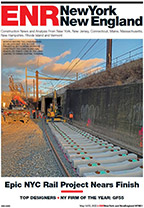New York City has issued a request for proposals (RFPs) for construction of a waste-to-energy conversion facility. The project, part of a new waste-reduction plan under the PlaNYC initiative, aims to double the rate of waste diverted from landfills, primarily through increased reuse, recycling and composting. Proposals are due by June 5.
The city will not provide capital funding for the state-of-the-art plant but will pay a per-ton fee to the plant operator, said Mayor Michael Bloomberg’s office in announcing the project on March 6. Private sector firms should submit plans for a pilot plant that would use sustainable and environmentally sound technology. The city says it will exclude conventional incineration or “mass burn” proposals.
“We are using the most comprehensive program in the nation to green our city, but we have to go further,” Bloomberg says.
Other requirements include locating the plant in the city or within 80 miles of it. The plant’s startup processing capacity should be a maximum of 450 tons of waste daily; the city currently processes about 10,000 tons per day. If the project is successful, plans call for expanding the facility to process 900 tons daily. Submitters must provide extensive emissions performance data and greenhouse gas-reduction data, which will be evaluated by the Dept. of Health and Mental Hygiene.
Proposals will be evaluated based on the submitter’s experience with the proposed technology, the quality of its technical proposal and environmental compliance data, and the commitment to environmental justice and community outreach, the city says.
The Dept. of Sanitation currently collects more than 3 million tons of waste annually from residences and institutions. The city says it spends more than $300 million to export this, primarily via truck, to landfills and facilities outside the five boroughs. The new waste-reduction plan seeks to double the amount of waste diverted from landfills from 15% to 30% by 2017.
The latest news and information
#1 Source for Construction News, Data, Rankings, Analysis, and Commentary
JOIN ENR UNLIMITEDCopyright ©2024. All Rights Reserved BNP Media.
Design, CMS, Hosting & Web Development :: ePublishing


Post a comment to this article
Report Abusive Comment